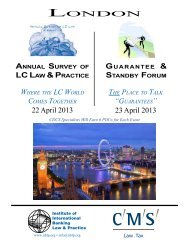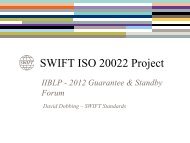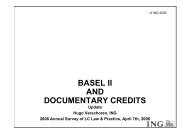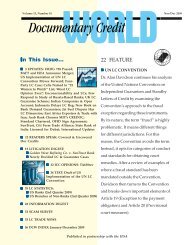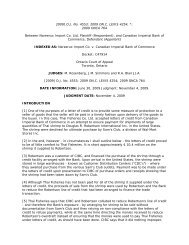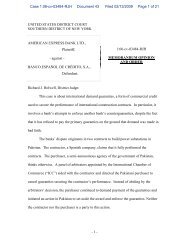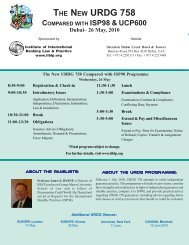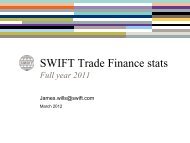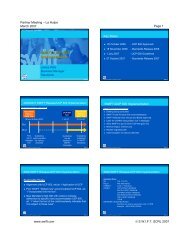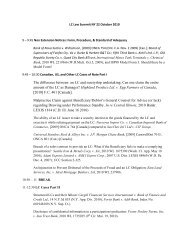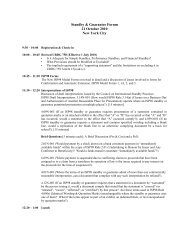FEATURE - The Institute of International Banking Law & Practice
FEATURE - The Institute of International Banking Law & Practice
FEATURE - The Institute of International Banking Law & Practice
You also want an ePaper? Increase the reach of your titles
YUMPU automatically turns print PDFs into web optimized ePapers that Google loves.
<strong>FEATURE</strong><br />
when they haven’t. Others<br />
added that the message<br />
doesn’t matter that much<br />
because the bank hasn’t<br />
obligated itself on its books.<br />
One delegate said that use <strong>of</strong><br />
the word “accept” is<br />
unacceptable and is similar to<br />
sending “documents under<br />
collection”. Bankers within the<br />
Americas need to be aware<br />
that around the world the first<br />
language is not English. One<br />
panelist expressed concern that<br />
banks won’t make the<br />
necessary adjustments on their<br />
books for a direct (rather than<br />
contingent) liability. If the<br />
bank doesn’t make the entry, it<br />
will lose in court.<br />
One panelist asked the<br />
audience if they would incur a<br />
deferred payment undertaking<br />
if the credit is not confirmed.<br />
Some banks indicated they<br />
would do so if there was a<br />
credit line available [for the<br />
issuing bank]. Others will do it<br />
if the customer asks and if it is<br />
a “big” customer. Some<br />
customers don’t want to pay a<br />
confirmation fee up front and<br />
are willing to take the chance<br />
that the line is available at the<br />
time <strong>of</strong> presentation. In such<br />
instances, does the bank use a<br />
disclaimer in its advices<br />
Responses were mixed. For<br />
one bank, it will not advise a<br />
credit with drafts drawn in it.<br />
Instead, it will revert to the<br />
issuing bank to have the drafts<br />
drawn on the issuing bank.<br />
Another bank will install a<br />
clause that will treat this as an<br />
unconfirmed deferred<br />
payment credit and will make<br />
payment when they receive it.<br />
One panelist reported that<br />
banks in Germany and Turkey<br />
do not want anyone to<br />
discount their deferred<br />
payments. Instead <strong>of</strong> making<br />
the credit available with<br />
themselves, they simply<br />
exclude UCP600 Articles 7(b)<br />
and 7(c). Another panelist<br />
cautioned that any bank acting<br />
under their nomination with<br />
this language in the credit is<br />
taking on incredible risk. <strong>The</strong><br />
purpose <strong>of</strong> this language is to<br />
restrict presentation and<br />
payment at their own<br />
counters.<br />
<strong>The</strong>re is no obligation to<br />
inform the beneficiary on the<br />
cover letter <strong>of</strong> exclusions and<br />
panelists advised delegates to<br />
refrain from doing so. Other<br />
panelists questioned what<br />
excluders think they are<br />
getting. He used the exclusion<br />
<strong>of</strong> UCP600 Article 7(c) as an<br />
example. Per United States<br />
law, Article 7(c) is not<br />
necessary because a<br />
Hong Kong<br />
Singapore<br />
2008 Annual Survey<br />
<strong>of</strong> LC <strong>Law</strong> & <strong>Practice</strong><br />
reimbursement is expected if a<br />
bank acts pursuant to its<br />
nomination.<br />
One panelist contends that<br />
if banks refuse to advise or<br />
confirm credits with such<br />
exclusions, then issuing banks<br />
will stop making these<br />
exclusions and it will diminish<br />
this bad practice.<br />
With regard to exclusion <strong>of</strong><br />
UCP600 Article 35, one panelist<br />
noted that an issuing bank can<br />
challenge the presenting bank<br />
to prove that the documents<br />
complied and that they were<br />
lost. In this manner, before the<br />
issuing bank reimburses, it can<br />
confirm that this was done.<br />
Given today’s technology,<br />
one panelist was curious about<br />
how banks treat scanned<br />
documents to see if such<br />
documents are originals. One<br />
delegate added that exporters<br />
can go to a carrier’s website<br />
and print out bills <strong>of</strong> lading, so<br />
how do banks know that these<br />
documents are originals and<br />
not photocopies <strong>The</strong>re are no<br />
simple answers and the same<br />
holds true for standby<br />
<strong>The</strong> Premier LC<br />
Event <strong>of</strong> the Year<br />
is Coming to Asia<br />
in July!<br />
Click on logo<br />
for details<br />
or see page 47.<br />
May 2008 Documentary Credit World 23



